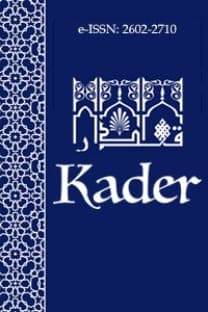Bâkıllânî’nin Fâil Merkezli Kozmolojik Kanıtı
Bu makalede Eşʿari kelâmcısı olan Bâkıllânî’nin Allah’ın varlığı ve birliğine dair verdiği argümanın mantıksal yapısını açığa çıkarmayı, böylelikle bu argümanın geleneksel anlamdaki ontolojik, kozmolojik veya teleolojik argüman kategorilerini aştığını göstermeyi hedeflemekteyim. Bâkıllânî’nin argümanını özel kılan varsaydığı tanrı kavramıdır. Herbert Davidson’un bu konudaki sezgilerini geliştirip Macid Fahri’nin yorumlamasını da eleştirerek söz konusu tanrı kavramının dayandığı fâil kavramını detaylı bir şekilde inceleyeceğim. Neticede, Bâkıllânî’nin Allah’ın varlığına dair özgün bir argüman geliştirdiğini iddia ediyor ve bu argümana “fâil merkezli kozmolojik kanıt” diyorum. Bu genel itibariyle kozmolojik bir kanıttır çünkü Allah’ın varlığına dair evrenden yapılan bir çıkarıma dayanır. Ancak fâil olma kavramı ve fâil bir tanrı fikri bu argümanda merkezi bir yer tuttuğundan literatürdeki kozmolojik kanıtlardan farklı değerlendirilmeyi hak etmektedir.
Anahtar Kelimeler:
Kelâm, kozmolojik kanıt, teleolojik kanıt, fâil merkezli kozmolojik kanıt, Bâkıllânî
Al-Bāqillāni’s Cosmological Argument from Agency
In this paper, I propose to expose the logical structure al-Bāqillānī’s argu- ment for the existence of God and argue that it presents a distinctive type of argument that cannot be classified under the classical types of ontological, cosmological, and design arguments. The peculiarity of al-Bāqillānī’s argument is related to the concept of God it presupposes. Developing Herbert Davidson’s insights regarding this argu- ment and criticizing Majid Fakhry’s interpretation of it, I aim to clarify this concept of God by the concept of agency. In a nutshell, I argue that al-Bāqillānī presents a dis- tinctive type of argument for the existence of God, which I propose calling the “cosmo- logical argument from agency.” I consider it cosmological because it is an inference from the universe to the existence of God. Nonetheless, it is different from the classic- al versions of the cosmological argument for that the concept of agency and the idea of a personal deity play a central role in this argument.
Keywords:
Kalâm, cosmological argument, teleological argument, cosmological argument from agency, Bâkıllânî,
___
- Herbert A. Davidson, Proofs for Eternity, Creation, and the Existence of God in Medieval Islamic and Jewish Philosophy (New York, 1987).
- Early Ašʿarite theology: Abū Bakr al-Bāqillānī (d. 403/1013) and his Hidāyat al-mustaršidīn,” Bulletin d’études orientales, 60 (2012).
- Richard Frank, “Bodies and atoms: The Ashʿarite analysis,” in Michael M. Marmura (ed.), Islamic Theology and Philosophy: Studies in Honor of George F. Hourani. (New York, 1984).
- Harry Austryn Wolfson, The Philosophy of the Kalam (Cambridge, 1976).
- Kâdî ʿAbd al-Jabbār, Şerhu’l-Usûli’l-Hamse: Mu‘tezile’nin Beş İlkesi, çev. İlyas Çelebi, 2 Cilt. (Istanbul, 2013).
- Kâdî ʿAbdü’l-Cebbâr, Kitâbu’l-Mecmû, ed. Jean Joseph Houben (Beirut, 1965).
- Joseph van Ess, “The Logical structure of Islamic Philosophy,” Logic in Classical Islamic Culture (Wiesbaden, 1970).
- Joep Lameer, Al-Fārābī and Aristotelian Syllogistics, Greek Theory and Islamic Practice (Leiden, 1994).
- Michel Allard, Le problème des attributs divins dans la doctrine d’al-Ashʿarī et de ses premiers grands disciples (Beirut, 1965).
- Husâm Muhî Eldîn al-Alousî, The Problem of Creation in Islamic Thought: Qur’an, Hadith, Commentaries, and Kalam (Baghdad, 1965).
- Kwame Gyekye, “Al-Ghazālī on action,” içinde Ghazali: La Raison et le Miracle. Table Ronde Unesco, 9–10 décembre 1985 (Paris, 1987).
- Michael V. Dougherty, “Al-Ghazālī and Metaphorical Predication in the Third Discussion of Tahāfut al-Falāsifa,” American Catholic Philosophical Quarterly, vol. 82, no. 3 (2008).
- Frank Griffel, Al-Ghazālī’s Philosophical Theology (Oxford, 2009).
- Ghazzâlî, El-İktiṣâd fî’l-İʿtikâd, ed. İbrahim A. Çubukçu ve Hüseyn Atay (Ankara, 1962), s. 92. & Al-Ghazālī, Al-Ghazālī’s Moderation in Belief, İng. Çev. Alaaddin M. Yakub (Chicago, 2013).
- Ghazzâlî, İḥyâʾ ʿUlûmu’d-Dîn, 4 cilt. (Cairo, 1957).
- Immanuel Kant, Critique of Pure Reason, İng. çev. Norman Kemp Smith (New York, 2003).
- Richard Swinburne, The Existence of God, 2nd edn (New York, 2004).
- Majid Fakhry, “The classical Islamic arguments for the existence of God,” Muslim World, vol. 47, no. 2 (1957).
- Başlangıç: 2003
- Yayıncı: Mehmet BULĞEN
Sayıdaki Diğer Makaleler
VAHİY ve İLHÂM BAĞLAMINDA ERKEN DÖNEM HANEFÎMÂTÜRÎDÎ KELÂM SİSTEMİNİN TASAVVUFLA İLİŞKİSİ
MÂTÜRÎDÎ’DE ‚ŞÂHİDİN GÂİBE DELÂLETİ‛ METODU
Mâturîdî’de “Şâhidin Gâibe Delâleti" Metodu
Mâturîdî’de “Şâhidin Gâibe Delâleti" Metodu
Kâdî Abdülcebbâr’da Mütevâtir Teorisi
Postmodern Dini Düşüncenin Teknoloji Karşıtı Kodları ve Üretim Ekonomisi
Rü’yetullah: Akıl Âyinesinde Cemâullah’ı Seyreylemek
Hacı Hasan Hilmi Efendi ve Ravzatü’s-Sü’adâ’sı -Tahkik, Tercüme ve Değerlendirme-
